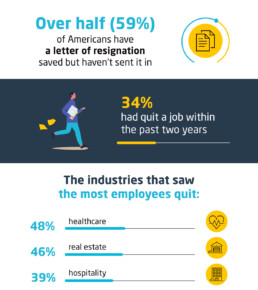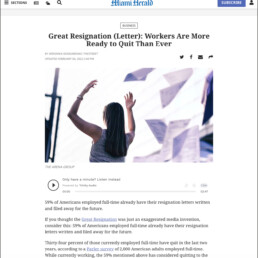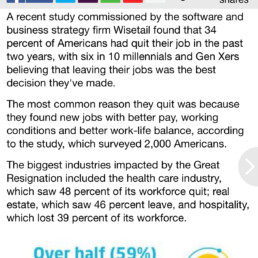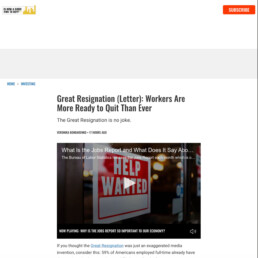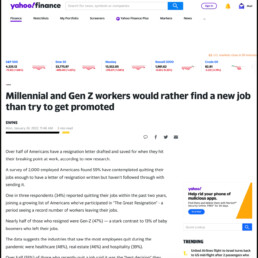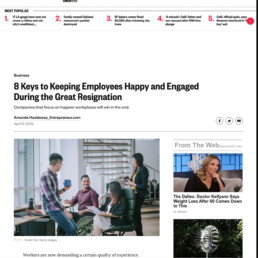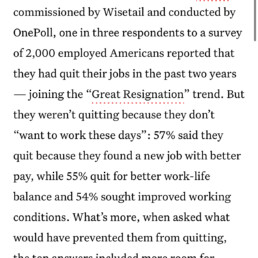
Research & earned media campaign
A look inside "The great resignation"
With the growing phenomenon of the "great resignation", Wisetail commissioned OnePoll to explore the topic further.
We drafted a questionnaire to find out what makes Americans consider quitting their jobs, and what would make them stay.
Our online survey polled 2,000 employed Americans, and revealed over half have a resignation letter drafted and saved for when they hit their breaking point.
The survey findings formed the basis of a data-driven news story for Wisetail, written and distributed by our news generation partner 72Point Inc.
2,000
American panelists
243
Pieces of coverage
13,300,000
Online coverage views
4,560
Social shares
Research insights
Why are Americans quitting their jobs?
In this online study for Wisetail, one in three respondents (34%) reported quitting their jobs within the past two years.
Nearly half of those who resigned were Gen-Z (47%) — a stark contrast to 13% of baby boomers who left their jobs.
The data suggests the industries that saw the most employees quit during the pandemic were healthcare (48%), real estate (46%) and hospitality (39%).
Over half (55%) of those who recently quit a job said it was the “best decision” they made in a long time, with 45% leaving for professional reasons and 29% quitting for personal reasons.
Interestingly, six in 10 millennials and Gen X especially believe leaving their jobs was the best decision they’ve made.
The most common reasons for quitting included finding a different job that offers better pay (57%), better work/life balance (55%) and better working conditions (54%).
Nearly nine in 10 (88%) of respondents who quit their job said they would have stayed if they were offered better benefits, such as having more opportunities for growth (52%), better working conditions (52%) and having internal career development (49%).
And most Americans blamed COVID-19 for quitting their jobs — since 66% believe the pandemic has directly affected what they do for work today. Nearly as many people (65%) have switched to different careers since the pandemic began in March 2020.
What would make them stay?
The Wisetail survey found that of the respondents who remain in their jobs, 63% believe they would make better bosses than their current boss. Half of the part-time respondents (49%) and 41% of people over 56 feel strongly about this point: they believe they’re better leaders than their actual bosses.
Almost as many (61%) wish they had more responsibilities at work than they currently do, and 57% feel the need to go job hunting because their bosses aren’t offering what they need.
Six in 10 (61%) would even take an average 14% pay cut if it meant working in a better environment. And whether they’re searching for work, three in four people believe their ideal job would be with a company that aligns with their personal values.
“Ultimately, people want to be heard. When people feel like their needs aren’t being addressed or met, they’re more likely to look elsewhere, where their needs can be met. Once they find a company where their values align, people will find themselves feeling happy with what they do,” said Ali Knapp, president at Wisetail.
Data-driven headlines
Earned media coverage of the 'Great Resignation'
Photo credit: header image by Luis Villasmil
OnePoll conducted research on behalf of Intertek Wisetail, with an online panel of 2,000 employed Americans. In the study, 59% said they have contemplated quitting their jobs enough to have a letter of resignation written but haven’t followed through with sending it.
BrandIntertek WisetailServicesOnline survey, News story, Infographic, Media distributionLinkwww.wisetail.comContact uswww.onepoll.us

